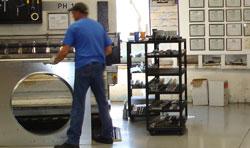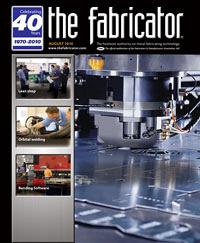Senior Editor
- FMA
- The Fabricator
- FABTECH
- Canadian Metalworking
Categories
- Additive Manufacturing
- Aluminum Welding
- Arc Welding
- Assembly and Joining
- Automation and Robotics
- Bending and Forming
- Consumables
- Cutting and Weld Prep
- Electric Vehicles
- En Español
- Finishing
- Hydroforming
- Laser Cutting
- Laser Welding
- Machining
- Manufacturing Software
- Materials Handling
- Metals/Materials
- Oxyfuel Cutting
- Plasma Cutting
- Power Tools
- Punching and Other Holemaking
- Roll Forming
- Safety
- Sawing
- Shearing
- Shop Management
- Testing and Measuring
- Tube and Pipe Fabrication
- Tube and Pipe Production
- Waterjet Cutting
Industry Directory
Webcasts
Podcasts
FAB 40
Advertise
Subscribe
Account Login
Search
Precision Sheet Metal Operator certification provides broad foundational knowledge
- By Tim Heston
- September 13, 2011
- Article
- Shop Management

>: Training certificates, including several Precision Sheet Metal Operator certifications, are posted by Metcam’s press brake area.
The metal fabrication industry grew up with its technology gurus. To get anywhere in their careers they had to know certain fundamentals: flat layout, bend deductions, and so on. Training took time and laid a solid foundation for success down the road. Today these gurus are department supervisors, plant managers, even chief executives.
Then the industry evolved into something different.
Globalization forced fabricators to squeeze more efficiency out of their operations. Fabricators needed to spend more time producing parts and less time setting up machines, and fabrication equipment-makers heard the call in a big way. Now an engineer working with CAD can export designs to nesting software, which in turn postprocesses and sends them to the blanking machine’s control.
It’s become so automated that a new operator can learn the ropes relatively quickly. Technology has forever changed the relationship between the master and apprentice. The masters, those shop gurus who learned through decades of hands-on experience—well, you probably know the issue at stake. They’re retiring.
“Today there may be operators in a business who don’t even know what flat layout is about,” said Jerry Ward, vice president of Metcam, a contract metal fabricator north of Atlanta. “You may have turret punch press operators who know how to punch. But when you give him a part to punch, he can’t look at a formed-up drawing and say that the part is right.”
The issue is that operators may be able to get by without that knowledge. But just because they can get by doesn’t necessarily mean they can enjoy a successful career. Nor can a successful shop rely solely on such operators. As Ward explained, “The software just can’t get the logic perfectly, so skilled technicians go back and tweak it—and you need a working ability with sheet metal to be able to do that.”
In other words, really optimizing an operation requires operator skill.
“Computers aren’t that intelligent,” added Rob Clark, vice president of operations at Clark Metal Products, Blairsville, Pa. “You need that human intervention, and the more you can troubleshoot and get to the bottom of a problem, the better off you are.”
This, Ward explained, illustrates the importance of several certificates hanging on the wall of the Metcam fab shop. They prove the accomplishments of several operators who have attained the Precision Sheet Metal Operator (PSMO) certification, a program offered by the Fabricators & Manufacturers Association (FMA). After they passed the exam, Ward called the operators into a meeting with the rest of the staff and presented them with $500 checks. “That amazed everyone in the building,” he said. “No one knew they’d be getting that.”
The PSMO certification is unique. The exam doesn’t cover just one process, which in a sense reflects how different metal fabrication is today: Workers need to be as flexible as modern manufacturing demands. To maintain certification, they also must earn a certain number of recertification credits during a three-year certification period. Credits can be acquired via online training programs, attending conference sessions and educational events, on-the-job training, or other projects.
Ward described how his own work force, more than 120 strong, has undergone extensive cross-training. The shop still has its department leads, those gurus that everyone turns to if they have a problem with a particular process. But many operators know the basics of multiple processes, from punching and bending to hardware insertion and painting.
Ward pointed to his lead press brake operator. He started out as a welder and was cross-trained on the press brake; today he manages the entire bending department. “Because he wanted to learn and had a positive attitude toward work flow, we realized he would be a good working lead. Today he sits in management meetings when we do production reviews.”
“I think any progressive fabricator has already started down the cross-training path,” added Clark, who is looking to integrate the PSMO certification at his Pennsylvania job shop. “To ensure people are well-rounded and can perform a variety of tasks, well, that’s really the name of the game.”
With a broad foundation, operators can move to different machines when needed, allowing shops to respond to widely fluctuating demands. Quick lead-times are now a necessity for survival.
Events of the past decade have transformed the nature of metal fabrication, and much of it has to do with inventory—and the lack thereof. “The whole industry culture changed after the dot-com bust and 9/11,” Ward recalled. “They both were a tremendous blow to the industry. But since the crisis that started in 2008, it’s become even more dramatic. No one has significant inventories. There is no such thing as a four-week delivery anymore, in my opinion. The industry is so competitive that we have to grasp everything we can just to stay a little jump ahead.
“This is why cross-training is so critical,” he continued. “Skilled, cross-trained people can move around to where the constraints are, to accommodate the customer.”
Larry Clark (no relation to Rob) is hoping to use the certification program to accommodate the needs of his students. Clark teaches welding at Moraine Park Technical College in Fond du Lac, Wis. In 2009 he helped launch a new metal fabrication program, and today he’s using the PSMO certification program as a benchmark.
“The exam is an easy sell,” he said. “Students will be going out there as entry-level people, and there are a lot of people who are looking for work right now. If they are certified operators, well, that’s something a lot of other people don’t have.”
The exam helps solve, at least to some extent, a conundrum that pervades manufacturing education. Because the PSMO certification exam is so broad, it ensures that those who have passed know a range of fabrication processes. Challenges remain, of course. Welding programs are difficult enough to fund, and bringing in massive laser cutting centers or other fabrication machinery can be nearly impossible for already cash-strapped technical schools. They can buy only so many pieces of fabrication equipment, and each student can spend only so much time at each machine.
As an educator, Clark is aiming to increase technology exposure for his students. He conducts plant tours when he can, but he also teaches the basics of several technologies through lecture and class participation. The classroom is no replacement for hands-on work, he said, but in the classroom students at least become familiar with the science behind sheet metal forming and fabrication, and passing the PSMO test proves they’ve absorbed the material. Knowing those fundamentals increases their chances of ramping up their skills quickly when they do get a job and start working regularly with the machines.
Clark cited one student who took the exam this year. The school’s shop has a laser cutting machine and a press brake, but no turret punch press. The budget just isn’t there for one. Still, the student learned how to think like a metal fabricator; he applied mechanical logic when answering those punch press questions on the PSMO exam—and passed.
That student is a bit like an aspiring novelist who masters grammar but hasn’t yet written a word of his own. He knows the grammar of metal fabrication. With such knowledge, he eventually will use automated equipment not as a crutch to compensate for a lack of skill, but as an empowerment tool that allows him to fabricate parts better, faster, and smarter.
About the Author

Tim Heston
2135 Point Blvd
Elgin, IL 60123
815-381-1314
Tim Heston, The Fabricator's senior editor, has covered the metal fabrication industry since 1998, starting his career at the American Welding Society's Welding Journal. Since then he has covered the full range of metal fabrication processes, from stamping, bending, and cutting to grinding and polishing. He joined The Fabricator's staff in October 2007.
subscribe now

The Fabricator is North America's leading magazine for the metal forming and fabricating industry. The magazine delivers the news, technical articles, and case histories that enable fabricators to do their jobs more efficiently. The Fabricator has served the industry since 1970.
start your free subscription- Stay connected from anywhere

Easily access valuable industry resources now with full access to the digital edition of The Fabricator.

Easily access valuable industry resources now with full access to the digital edition of The Welder.

Easily access valuable industry resources now with full access to the digital edition of The Tube and Pipe Journal.
- Podcasting
- Podcast:
- The Fabricator Podcast
- Published:
- 04/16/2024
- Running Time:
- 63:29
In this episode of The Fabricator Podcast, Caleb Chamberlain, co-founder and CEO of OSH Cut, discusses his company’s...
- Trending Articles
AI, machine learning, and the future of metal fabrication

Employee ownership: The best way to ensure engagement

Steel industry reacts to Nucor’s new weekly published HRC price

Dynamic Metal blossoms with each passing year

Metal fabrication management: A guide for new supervisors

- Industry Events
16th Annual Safety Conference
- April 30 - May 1, 2024
- Elgin,
Pipe and Tube Conference
- May 21 - 22, 2024
- Omaha, NE
World-Class Roll Forming Workshop
- June 5 - 6, 2024
- Louisville, KY
Advanced Laser Application Workshop
- June 25 - 27, 2024
- Novi, MI


























